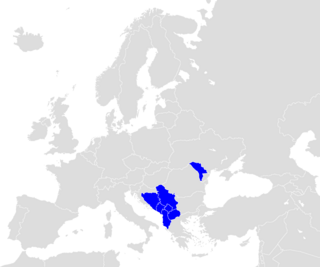
The Central European Free Trade Agreement (CEFTA) is an international trade agreement between countries mostly located in Southeastern Europe. Founded by representatives of Poland, Hungary and Czechoslovakia, CEFTA in 2006 expanded to Albania, Bosnia and Herzegovina, Bulgaria, Croatia, Moldova, Montenegro, North Macedonia, Romania, Serbia, Slovenia and the UNMIK.
Europe, the westernmost portion of Eurasia, is often divided into regions and subregions based on geographical, cultural or historical factors. Since there is no universal agreement on Europe's regional composition, the placement of individual countries may vary based on criteria being used. For instance, the Balkans is a distinct geographical region within Europe, but individual countries may alternatively be grouped into South-eastern Europe or Southern Europe.

Southeast Europe or Southeastern Europe (SEE) is a geographical subregion of Europe, consisting primarily of the cultural region of Balkans, as well as adjacent regions and archipelagos. There are overlapping and conflicting definitions of the region, due to political, economic, historical, cultural, and geographical considerations.
The European Union Special Representatives (EUSR) are emissaries of the European Union with specific tasks abroad. While the EU's ambassadors are responsible for affairs with a single country, Special Representatives tackle specific issues, conflict areas or regions of countries. They answer directly to the High Representative of the Union for Foreign Affairs and Security Policy, currently Josep Borrell.
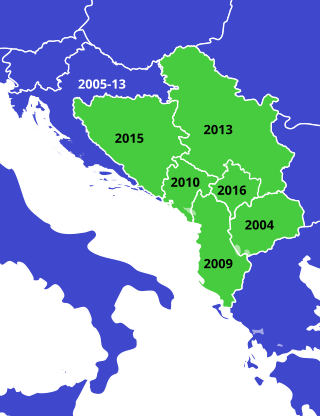
In talks with countries that have expressed a wish to join the European Union, the EU typically concludes Association Agreements in exchange for commitments to political, economic, trade, or human rights reform in that country. In exchange, the country may be offered tariff-free access to some or all EU markets, and financial or technical assistance.

The South-East European Cooperation Process (SEECP) was launched on Bulgaria's initiative in 1996. At the Bulgaria-chaired meeting in Sofia, the Southeast Europe (SEE) countries laid the foundations for regional co-operation for the purposes of creating an atmosphere of trust, good neighbourly relations and stability.

The Commissioner for Neighbourhood and Enlargement is the member of the European Commission in charge of overseeing the accession process of prospective new member states and relations with those bordering the European Union (EU). The present Commissioner, as of December 2019, is Olivér Várhelyi.

Albania is on the current agenda for future enlargement of the European Union (EU). It applied for EU membership on 28 April 2009, and has since June 2014 been an official candidate for accession. The Council of the European Union decided in March 2020 to open accession negotiations with Albania.
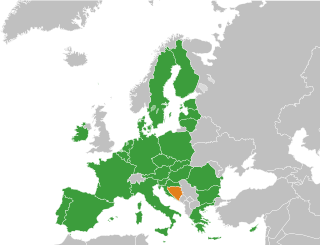
The accession of Bosnia and Herzegovina to the European Union is the stated aim of the present relations between the two entities. Bosnia and Herzegovina has been recognised by the EU as a "candidate country" for accession since the decision of the European Council in 2022 and is on the current agenda for future enlargement of the EU. Bosnia and Herzegovina takes part in the Stabilisation and Association Process and trade relations are regulated by an Interim Agreement.
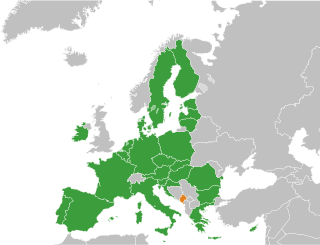
Accession of Montenegro to the European Union is on the agenda for future enlargement of the EU.
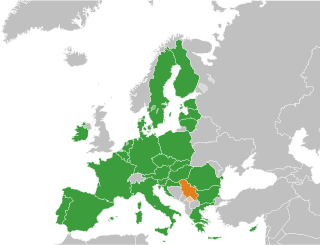
Serbia applied to join the European Union (EU) in 2009 and has been a candidate for membership since 2012, along with nine other states. Serbia is the largest country in Southeast Europe seeking entry into the EU.

The accession of Kosovo to the European Union (EU) is on the current agenda for future enlargement of the EU. Kosovo is currently recognized by the EU as a potential candidate for accession.

The accession of North Macedonia to the European Union has been on the current agenda for future enlargement of the EU since 2005, when it became an official candidate for accession. The Republic of Macedonia submitted its membership application in 2004, thirteen years after its independence from Yugoslavia. It is one of nine current EU candidate countries, together with Albania, Bosnia and Herzegovina, Georgia, Moldova, Montenegro, Serbia, Turkey and Ukraine.
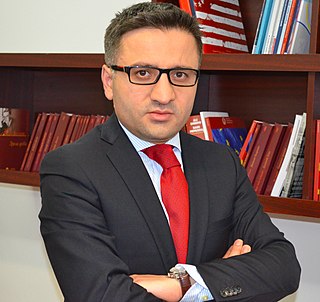
Fatmir Besimi is a Macedonian politician and economist of Albanian ethnicity. He currently served for Minister of Finance in North Macedonia, He also served twice as Minister of Economy then Minister of Defence and after that he was Deputy Prime Minister of the Government of the Republic of Macedonia in charge of European Affairs. In 2010 he was selected as one of the top European Ministers in the group of Young Global Leaders by World Economic Forum.
The European Stability Initiative (ESI) is a think tank focusing on South East Europe and enlargement of the European Union. It has offices in Berlin, Brussels and Istanbul.

The Berlin Process is an intergovernmental cooperation initiative linked to the future enlargement of the European Union.

2016 Western Balkans Summit in Paris, France was third annual summit within the Berlin Process initiative for European integration of Western Balkans states. Previous summits took place in Berlin in 2014 and in Vienna in 2015. Heads of government, foreign ministers and the ministers of economy of Albania, Bosnia and Herzegovina, Kosovo, Republic of Macedonia, Montenegro, Serbia, as well as EU member states from the region Croatia, Slovenia and EU member states Austria, France, Germany, Italy as well as representatives of the European Union and the International Financial Institutions took part in Paris summit. Summit took place on 4 July 2016. Participants welcomed the intention of Italy to host the next summit in 2017.
The Centre for Contemporary Politics is an independent, non-governmental and non-profit organization founded in Belgrade in May 2012. The centre is a think tank focused on a range of fields, including reforms of the political system, foreign affairs and security, as well as protection of human and minority rights. The centre's primary mission is to enact reforms to the political system that protect human and minority rights, as well as ensure a safe and fair integration of Serbia into greater Europe. Operating as a think-tank, the Centre for Contemporary Politics conducts assessments and analyses on the various political issues facing the region, including political integrity, national security, and human rights. It develops and proposes objective strategies to deal with threats to the region's political and social fabric, regional stability and cooperation and protection through PR and public awareness campaigns, community forums and youth leadership training.
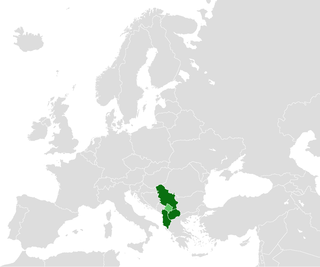
The Open Balkan is an economic and political zone of three member states in the Balkans, those being Albania, North Macedonia and Serbia. The zone has a total area of 131,935 km2 (50,940 sq mi) and an estimated total population of almost 12 million located in Central and Southern Europe. The official languages are Albanian, Macedonian and Serbian. Its administrative centres are the cities of Belgrade, Skopje and Tirana. With the establishment of the zone, all three member states aim to increase trade and cooperation as well as improve bilateral relations.

The Strategy for the Western Balkans is a policy pursued by the EU with its partners and accession candidates in the western region of the Balkan Peninsula. Announced by European Commission President Jean-Claude Juncker in his 2017 State of the Union address, this policy brings together the objectives of the global strategy for CSDP and the enlargement policy specific to the states in this region.


















